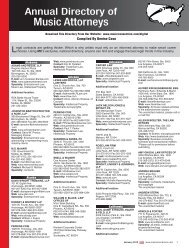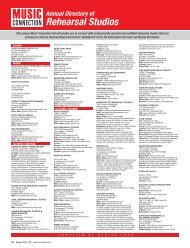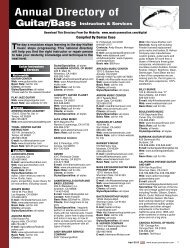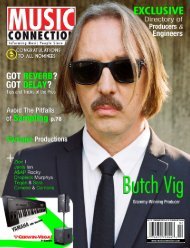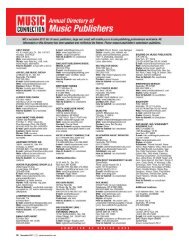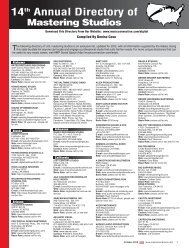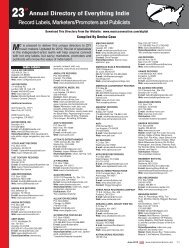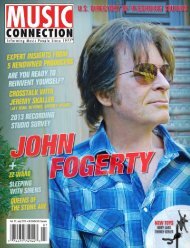CONTENTS
View/Download the new issue PDF here - Music Connection
View/Download the new issue PDF here - Music Connection
- No tags were found...
Create successful ePaper yourself
Turn your PDF publications into a flip-book with our unique Google optimized e-Paper software.
– TOM KIDD<br />
Brian Tyler<br />
Scores for Frailty, The Fast and The Furious, Call of Duty: MW3<br />
rian Tyler has been<br />
reading Music<br />
BConnection ever since<br />
he started out in the business,<br />
back in the mid-‘90s, in the<br />
days when he was trying<br />
to decide whether to be a<br />
musician or a composer (http://<br />
briantyler.com).<br />
His education fit him well,<br />
whether earned through MC,<br />
UCLA where he received his<br />
Bachelor’s Degree or Harvard<br />
where he earned his Master’s<br />
Degree. Recently nominated<br />
for “Film Composer of the Year”<br />
by the International Film Music<br />
Critics Association, Tyler has<br />
composed and conducted for<br />
over 50 films. His work has<br />
included scores for Eagle Eye<br />
for producer Steven Spielberg,<br />
the box office hit The Fast and<br />
The Furious, The Expendables<br />
and Rambo, directed by<br />
Sylvester<br />
Stallone, as<br />
well as the<br />
best-selling<br />
video game of<br />
all time Call of<br />
Duty: Modern<br />
Warfare 3.<br />
He also wrote<br />
the music<br />
for Steven<br />
Spielberg’s new<br />
20th-Century<br />
Fox series<br />
Terra Nova.<br />
Hits always<br />
garner praise for a composer.<br />
This aspect can be either<br />
confusing or amusing, but Tyler’s<br />
approach is straightforward.<br />
“It’s hard to tell when a movie is<br />
going to be a hit, so you give it<br />
your all,” he says of the process.<br />
“It’s always interesting to see<br />
what the critics and audiences<br />
say. Sometimes the movie score<br />
lives on and inspires people to<br />
see the film and sometimes vice<br />
versa.”<br />
Tyler’s approach has served<br />
him well ever since his debut<br />
film, the 2001 psychological<br />
thriller Frailty, starring Bill<br />
Paxton—who also made his<br />
directorial debut with the film.<br />
Nobody knew anymore what to<br />
expect from this intimate horror<br />
piece than from any other film in<br />
production. For his part, Tyler says<br />
he “had no idea that Frailty would<br />
be the key to my getting larger<br />
studio films. You can really draw<br />
a line between them.” A box office<br />
and critical success, Frailty won<br />
“When you’re hired for a film, it’s like<br />
you’re joining a band. The director may<br />
not speak music, so the composer has to<br />
learn how to speak film.”<br />
Tyler a World Soundtrack Award<br />
in 2002 as well as The World<br />
Soundtrack Award as Best New<br />
Film Composer of the Year.<br />
One result of his accolades<br />
and attitude has led to Tyler<br />
being offered<br />
projects that<br />
are particularly<br />
heavy with<br />
score. His<br />
approach to<br />
each is the<br />
same. “You<br />
try to make<br />
the film as<br />
good as it can<br />
be but also<br />
concentrate on<br />
the musicality,”<br />
he says.<br />
“You have to<br />
be unafraid<br />
of making<br />
a mistake<br />
because otherwise you don’t<br />
say anything and end up with<br />
musical wallpaper.”<br />
No composer wants to blend<br />
into the background of a film,<br />
yet the composer’s job is, at<br />
its core, to assist the director<br />
to realize his or her vision.<br />
Any aspect of filmmaking<br />
requires a tricky balance<br />
between art and commerce.<br />
“It’s the director’s vision but<br />
the composer is trying to help<br />
the film overall,” Tyler says.<br />
“They may have expectations<br />
of the music but you throw<br />
them something different. I will<br />
always try to present the music<br />
as something that helps the<br />
film. In the end, it’s great when<br />
everyone agrees on something<br />
that seemed like a surprise.”<br />
Tyler has learned through<br />
experience how to present<br />
his art, but also how to work<br />
efficiently. The key is education.<br />
“You have to both love film<br />
music and learn film music,” he<br />
advises. “When you’re hired<br />
for a film, it’s like you’re joining<br />
a band. The director may not<br />
speak music so the composer<br />
has to learn how to speak film.”<br />
The best way to learn the<br />
language of film, to Tyler, is to<br />
immerse oneself in the world of<br />
film. “About half of the composers<br />
I know started as assistants or<br />
interns to other composers,”<br />
he says. “Companies tend to<br />
promote from within.”<br />
Contact Jeff Sanderson,<br />
jeff@chasenpr.com<br />
44 November 2013 musicconnection.com



